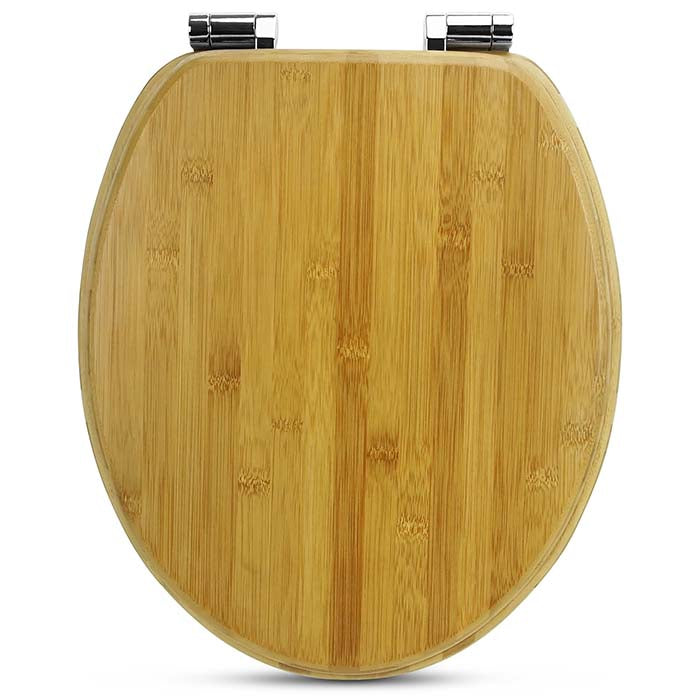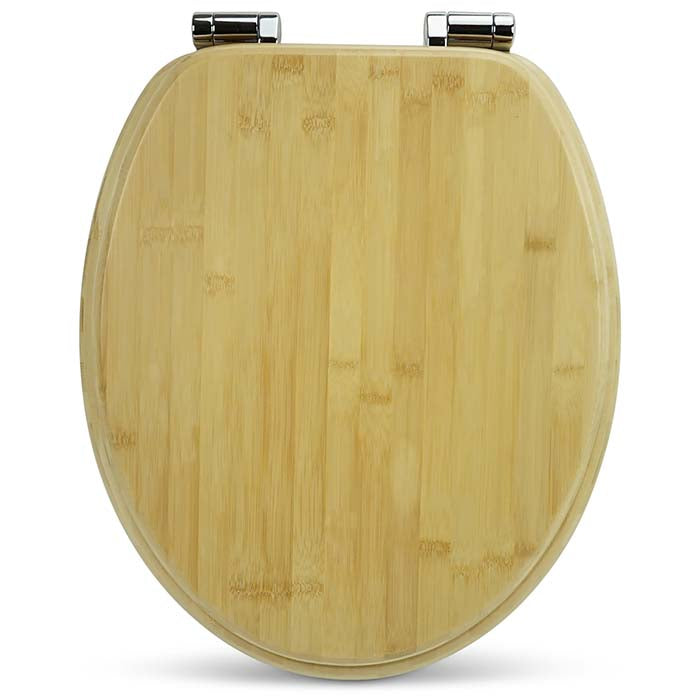Bamboo toilet seats: The sustainable alternative to Duroplast
Bamboo is a fast-growing raw material that consumes fewer resources than traditional materials. Using bamboo for toilet seats has several advantages:
- Sustainability: Bamboo grows faster than other woods and regenerates itself.
- Durability: Bamboo toilet seats are stable and resistant to moisture.
- Aesthetics: They give the bathroom a natural and warm appearance.
- Eco-friendliness: Minimal use of chemicals and a low carbon footprint.
Additionally, bamboo toilet seats are hypoallergenic, making them ideal for households with allergy sufferers.
Introduction to sustainable toilet seats
Sustainable toilet seats are becoming increasingly important due to rising environmental awareness. Traditional materials like duroplast and thermoplast are difficult to decompose and contribute to pollution. Therefore, alternatives made from eco-friendly materials are being sought, and bamboo is a major focus.
Reasons for sustainability
- Eco-friendly: Bamboo grows quickly and requires few resources.
- Biodegradable: Unlike plastic materials, bamboo decomposes without leaving harmful residues.
- Durability: Bamboo is robust and long-lasting, reducing the need for frequent replacements.
These characteristics make bamboo an excellent choice for sustainable sanitary products.
Things to consider when buying bamboo toilet seats
When purchasing bamboo toilet seats, several factors should be considered:
- Material quality: High-quality, FSC-certified bamboo ensures durability and sustainability.
- Care and cleaning requirements: Easy-to-clean surfaces and sturdy construction are essential for everyday use.
- Installation: Simple installation instructions and necessary mounting materials should be included.
- Compatibility: Ensure the seat fits most types of toilets.
- Design and comfort: Ergonomic shape and aesthetically pleasing design offer added comfort.
Advantages of bamboo toilet seats
Bamboo toilet seats offer numerous benefits that make them a preferred choice for environmentally conscious consumers.
- Sustainability: Bamboo is one of the fastest-growing plants and requires less water and pesticides.
- Durability: High-quality bamboo toilet seats are sturdy and resilient, increasing their lifespan.
- Aesthetics: They give bathrooms a natural and warm look.
- Comfort: Bamboo offers a more pleasant seating temperature compared to plastic.
- Eco-friendliness: They are biodegradable and leave a smaller carbon footprint.
How to care for bamboo toilet seats
Caring for a bamboo toilet seat is simple and helps extend its lifespan.
- Cleaning:
- Use mild cleaning agents.
- Avoid abrasive or chemical cleaners.
- Wipe the seat regularly with a damp cloth.
- Drying:
- Ensure the seat dries completely after cleaning.
- Avoid contact with standing water.
- Protection:
- Occasionally treat the wood with a special bamboo oil.
- Avoid prolonged exposure to direct sunlight.
Proper care keeps the bamboo toilet seat hygienic while preserving its natural shine and stability.
Sustainability aspects of bamboo toilet seats
Bamboo toilet seats offer numerous advantages in terms of sustainability and environmental friendliness. These aspects include:
- Fast-growing resource: Bamboo grows rapidly, often up to a meter per day, and requires no pesticides.
- CO2 absorption: Bamboo absorbs large amounts of CO2, significantly more than conventional trees.
- Biodegradability: Bamboo products are fully compostable after use.
- Low water consumption: Bamboo cultivation requires significantly less water compared to other types of wood.
- Renewable resource: Bamboo can be harvested without replanting, making it extremely sustainable.
Disadvantages of bamboo toilet seats
Despite the many advantages of bamboo toilet seats, there are also some disadvantages to consider:
- Cost: Bamboo toilet seats are often more expensive than their duroplast counterparts.
- Maintenance: Bamboo requires more care and regular sealing to prevent moisture damage.
- Durability: While bamboo is durable, it can swell or crack if exposed to prolonged moisture.
- Compatibility: Not all bathroom designs aesthetically match bamboo.
- Availability: Bamboo toilet seats are not always available in all hardware stores or online shops.
It is important to weigh these factors before deciding on a bamboo toilet seat.
The future of sustainable toilet seats
The future of sustainable toilet seats lies in the development of ecological materials and designs. Innovative companies are focusing on:
- Materials: Further research into biodegradable and recyclable materials beyond bamboo.
- Production techniques: Optimizing resource-saving production processes and minimizing energy consumption.
- Durability: Development of long-lasting products to extend lifespan and reduce waste volume.
Expert quote:
"The shift to sustainable materials in everyday products is an important step toward a more eco-friendly future."
These initiatives show that the potential for sustainable toilet seats is significant.
Conclusion and Summary
The consideration of bamboo as a material for toilet seats reveals numerous advantages. Bamboo is a fast-growing resource that can serve as an eco-friendly alternative to traditional duroplast. Thanks to modern processing methods, bamboo achieves high strength and is also biodegradable.
- Sustainability: Bamboo grows quickly and requires no pesticides.
- Strength: Comparable to traditional duroplast.
- Environmental compatibility: Fully biodegradable and low CO₂ footprint.
In practice, bamboo toilet seats show a high resistance to moisture. They impress with their durability and sturdiness.




